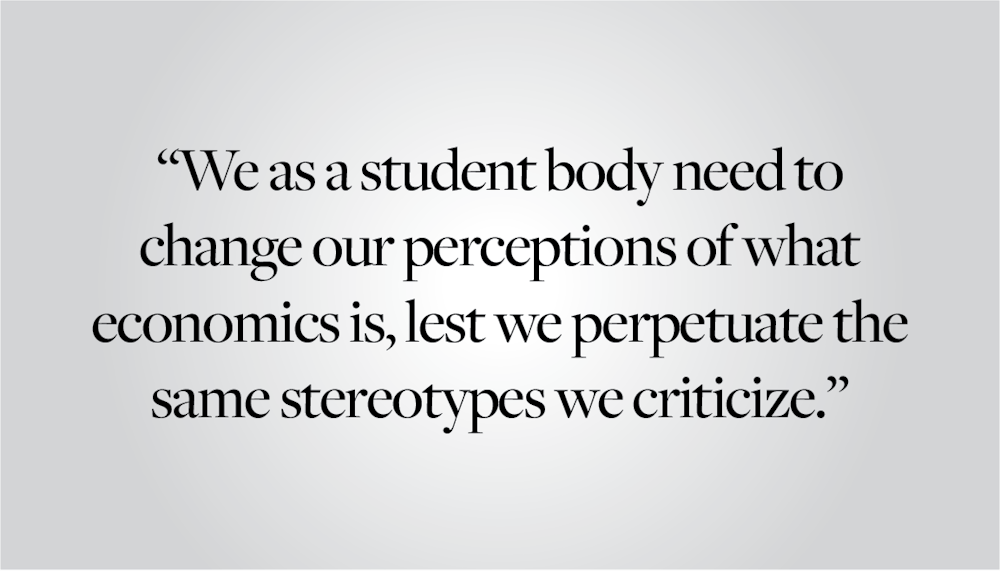Entering college, I was hesitant about taking an economics course. When I finally did, I often found myself rationalizing the decision to those around me: “Sure, ‘Introduction to Game Theory’ is technically an econ course, but it’s more mathematical than anything else.” I now admit that my reasoning was flawed on multiple levels. How could I claim that game theory is unrelated to economics when the first two games we studied modeled the behavior of corporate duopolies? It certainly doesn’t help my case that the course is designated ECON 1090. Why does it make me so uncomfortable to admit that I am taking an economics course?
Upon reflection, the stigmas of selfishness, greed and wealth often associated with the concentration — along with the perception that an economics degree can only produce investment bankers and consultants — invariably dissuaded my desire to participate. The last thing I want is to be a nameless opportunist. But at the same time, I cannot deny my fascination with the subject.
It is a prevailing stereotype that those who study economics are just in it for the money. While I’m sure that the promise of a lucrative career is one reason why economics is the second most popular concentration at Brown, economics is not exclusively about making money and this stereotype has harmful real-world implications. If we confine ourselves to thinking that concentrating in economics can only lead to careers in the private sector, we may drive individuals with diverse perspectives and experiences away from the field. We as a student body need to change our perceptions of what economics is, lest we perpetuate the same stereotypes we criticize.
Economics is not inherently selfish, and there are many legitimate — dare I say altruistic — uses for a degree in the field. Economics encompasses a wide range of topics including race, women’s rights and healthcare. Studying economics gives one the power to change the world. Take Neale Mahoney ’05, an economics professor at Stanford who is well known for illuminating the scope of the country’s medical debt crisis, for example.
But to Brown students, economics appears inextricably linked to careers on Wall Street — not careers studying the pitfalls of the free market. According to internal documentation within the Brown economics department from 2016, one of the top reasons students cited for not pursuing economics after taking an introductory course was that the field “has a reputation for students interested in banking/finance which I am not.” Wall Street carries connotations of its own about greed, and also a reputation about the racial and gender breakdown of the field, which skews overwhelmingly white and male. The stereotypes about greed, careers and race are not the only cause of the field’s homogeneity — but they all amplify each other.
But our current attachment to these stereotypes is potentially upholding the hegemony of white men over the field.
The lack of faculty diversity within Brown’s economics department only exacerbates these existing stereotypes. The department’s second faculty member of color only began at the University in fall 2019, according to a 2018-19 report summary from Brown’s Academic Departmental Diversity and Inclusion Action Plan. Additionally, per a memo put out by the University’s Diversity and Inclusion Oversight Board in 2022, the economics department has failed to substantially improve its diversity in recent years. Students who aren’t white men should see their life experiences reflected in their professors — faculty diversity could reshape these preconceptions.
The Department of Economics can also help break down these harmful stereotypes — which turn students from historically underrepresented groups away from concentrating in economics — by establishing a summer pre-orientation program similar to the New Scientist-Catalyst or Mosaic+ Transition Program. These programs have been proven to help students enter spaces that are racially or socioeconomically different from their own background. The Mosaic+ Transition Program, for example, has year after year improved retention rates for groups that are historically underrepresented in computer science, which is a field dominated by white men.
I admit that it’s fun to tease one’s economics concentrator friends occasionally, and I’ve definitely made my fair share of jokes. But instead of leaning further into harmful stereotypes about what economics is and who belongs in the field, we must work to change them.
Victor Chang ’27 can be reached at victor_a_chang@brown.edu. Please send responses to this opinion to letters@browndailyherald.com and other op-eds to opinions@browndailyherald.com.





